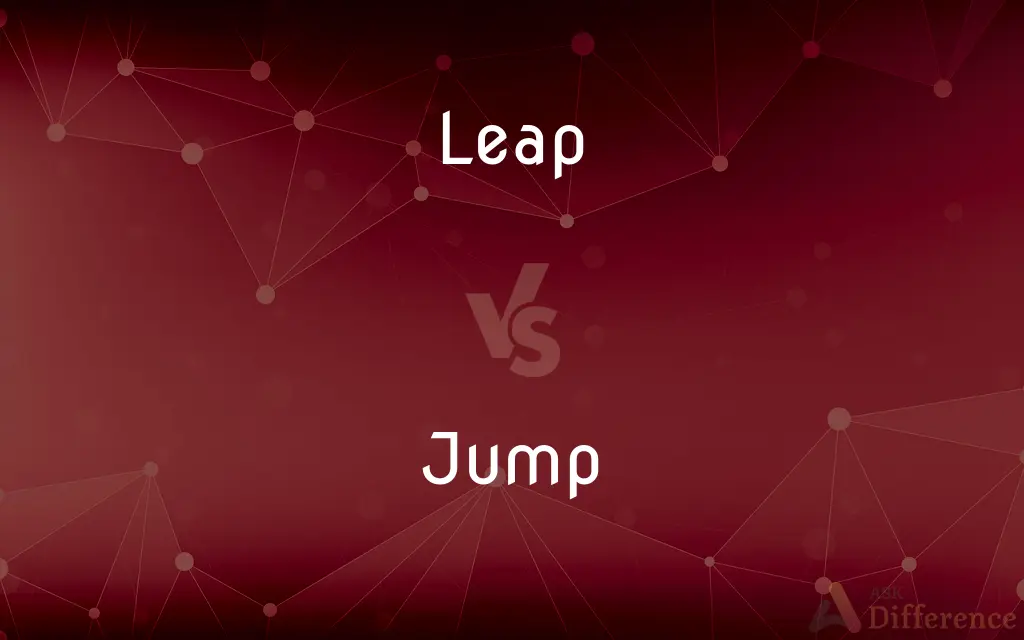Leap vs. Jump — What's the Difference?
By Maham Liaqat & Urooj Arif — Updated on March 2, 2024
Leap emphasizes a sudden or forceful movement, often with a specific direction or purpose, while jump refers to a more general action of propelling oneself off the ground.

Difference Between Leap and Jump
Table of Contents
ADVERTISEMENT
Key Differences
Leaping and jumping are physical movements that involve propelling the body into the air, but they differ in context, intention, and often in the distance or height achieved. A leap is typically characterized by a long or high movement, often made with considerable force or in order to overcome an obstacle or reach a specific destination. It implies a certain level of agility and purpose, such as leaping over a gap or towards a particular spot.
On the other hand, jumping is a broader term that encompasses any motion in which the feet leave the ground. It can be for joy, exercise, or as part of a competitive sport like high jump or long jump. Jumping may not always have a specific direction or target unlike leaping, which often has a clear aim or goal.
In sports, the distinction becomes clearer; athletes leap in sports like gymnastics or ballet, where elegance and precision in landing are crucial, whereas they jump in basketball or volleyball, focusing on height or distance often without the need for precise control over the landing spot.
The physical exertion involved in leaping is generally greater than that in jumping. Leaping requires a significant burst of energy to cover larger distances or heights and is often used in situations where obstacles must be overcome or specific targets must be reached. In contrast, jumping can be a repetitive, rhythmic activity, such as when skipping rope or doing jumping jacks, not necessarily intended to cover distance or height.
Culturally, leaping and jumping hold different connotations. A leap is often used metaphorically to describe a significant, sometimes risky, move forward, as in "taking a leap of faith." Jumping, meanwhile, can signify starting something new or entering enthusiastically, as in "jumping into a new project."
ADVERTISEMENT
Comparison Chart
Definition
A forceful, directed movement over distance or obstacle
A general action of propelling oneself off the ground
Context
Often implies a purpose or target
Can be spontaneous or without specific direction
In Sports
Used in contexts requiring precision and elegance
Often associated with height or distance
Physical Exertion
Higher, due to the need for greater force
Can vary, but often less than leaping
Cultural Connotation
Implies significant or purposeful progress
Signifies starting or enthusiasm
Compare with Definitions
Leap
A sudden or forceful movement over a distance or obstacle, implying direction and purpose.
The dancer's leap across the stage captured the audience's attention.
Jump
A basic physical action of propelling oneself off the ground, applicable in various contexts.
The children were jumping with joy at the news.
Leap
In sports, a movement requiring precision and often used to overcome specific obstacles.
The gymnast executed a perfect leap over the vault.
Jump
In sports, refers to actions aiming for height or distance without the need for obstacle clearance.
The athlete won the gold medal in the long jump.
Leap
A movement that emphasizes agility and the ability to move or advance significantly.
The cat made a graceful leap onto the fence.
Jump
A repetitive action used in exercises or activities, such as jumping jacks or skipping rope.
He incorporated jumping rope into his daily workout routine.
Leap
A metaphorical term for taking a significant step forward, often with risk involved.
Quitting her job to start her own business was a huge leap of faith.
Jump
Implies a quick or sudden movement, not necessarily directed or with a specific purpose.
He jumped when he heard the loud noise.
Leap
Often associated with a specific aim, such as leaping towards a goal or destination.
He took a leap towards the finish line, securing his victory.
Jump
Can indicate an enthusiastic start or engagement with something new.
She jumped at the chance to travel abroad.
Leap
Move quickly and suddenly
Polly leapt to her feet
Jump
To propel oneself upward or over a distance in single quick motion or series of such motions.
Leap
Jump or spring a long way, to a great height, or with great force
Fabia's heart leapt excitedly
He leapt on to the parapet
Jump
To move suddenly and in one motion
Jumped out of bed.
Leap
A forceful jump or quick movement
She came downstairs in a series of flying leaps
Jump
To move involuntarily, as in surprise
Jumped when the phone rang.
Leap
To change quickly or abruptly from one condition or subject to another
Always leaping to conclusions.
Jump
Jumps A condition of nervousness. Often used with the.
Leap
To act quickly or impulsively
Leaped at the opportunity to travel.
Jump
An instance of employing a parachute to leave an aircraft or elevated location.
She was terrified before the jump, but was thrilled to be skydiving.
Leap
To spring clear of the ground, with the feet; to jump; to vault; as, a man leaps over a fence, or leaps upon a horse.
Leap in with me into this angry flood.
Jump
An abrupt increase in the height of the surface of a flowing liquid at the location where the flow transitions from supercritical to subcritical, involving an abrupt reduction in flow speed and increase in turbulence.
Leap
To spring or move suddenly, as by a jump or by jumps; to bound; to move swiftly. Also Fig.
My heart leaps up when I beholdA rainbow in the sky.
Jump
The act of jumping; a leap; a spring; a bound.
Leap
To pass over by a leap or jump; as, to leap a wall, or a ditch.
Jump
To spring free from the ground by the muscular action of the feet and legs; to project one's self through the air; to spring; to bound; to leap.
Not the worst of the three but jumps twelve foot and a half by the square.
Leap
A light springing movement upwards or forwards
Jump
To pass over by means of a spring or leap; to overleap; as, to jump a stream.
Leap
The distance leaped (or to be leaped);
A leap of 10 feet
Jump
A sudden involuntary movement;
He awoke with a start
Leap
Cause to jump or leap;
The trainer jumped the tiger through the hoop
Jump
Pass abruptly from one state or topic to another;
Leap into fame
Jump to a conclusion
Jump
Go back and forth; swing back and forth between two states or conditions
Common Curiosities
What is the key difference between leaping and jumping?
The key difference is in the intention and direction; leaping is often a directed and forceful movement to cover distance or overcome obstacles, while jumping is more general and not necessarily directed.
How do cultural perceptions of leaping and jumping differ?
Culturally, leaping is often seen as a metaphor for significant progress or taking risks, whereas jumping might be associated with starting something new or with enthusiasm.
Why might an athlete choose to leap rather than jump?
An athlete might leap to achieve greater distance or height with precision, especially when overcoming an obstacle or targeting a specific landing area.
Can the terms leap and jump be used interchangeably?
While sometimes used interchangeably in casual conversation, they have different connotations, especially in sports or when describing purposeful actions.
Can jumping be considered a form of exercise?
Yes, jumping activities like jump rope, jumping jacks, or plyometrics are effective forms of cardiovascular and strength training.
Are there any animals known for their ability to leap?
Yes, animals like kangaroos, gazelles, and frogs are known for their impressive leaping abilities.
Is jumping always less physically demanding than leaping?
Generally, yes, because leaping usually requires more force and energy to cover greater distances or heights, but intense jumping activities can also be physically demanding.
Can leaping be dangerous?
Yes, especially if done without proper technique or in hazardous environments, it can lead to injury.
How do video games simulate leaping and jumping?
Video games use physics engines and animations to mimic these actions, often enhancing them for entertainment.
What does "taking a leap of faith" imply?
It implies making a significant decision or change without being sure of the outcome, trusting that it will lead to positive results.
How do children's games involving jumping differ from adult fitness routines?
Children's games focus on fun and spontaneity, while adult fitness routines are structured for physical benefits, though both can involve similar jumping actions.
What equipment is used in competitive jumping sports?
Equipment varies by sport, including high jump bars, long jump pits, and pole vault poles.
What skills are developed through jumping and leaping activities?
They develop coordination, agility, strength, and spatial awareness.
Why is precise landing important in leaping but not always in jumping?
Precise landing in leaping is crucial to avoid injury and achieve specific goals, such as in gymnastics, while general jumping may not require such precision.
How do authors use the concept of leaping in literature?
Authors often use leaping as a metaphor for characters overcoming challenges or making significant life changes.
Share Your Discovery

Previous Comparison
Tonner vs. Toner
Next Comparison
Cowardish vs. CowardlyAuthor Spotlight
Written by
Maham LiaqatCo-written by
Urooj ArifUrooj is a skilled content writer at Ask Difference, known for her exceptional ability to simplify complex topics into engaging and informative content. With a passion for research and a flair for clear, concise writing, she consistently delivers articles that resonate with our diverse audience.














































